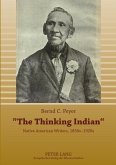Seminar paper from the year 2009 in the subject American Studies - Literature, grade: 1,0, Humboldt-University of Berlin (Department of English and American Studies), course: Native American Literature, language: English, abstract: INTRODUCTION Karen Louise Erdrich, born in Minnesota in 1954 as the eldest of seven children, was raised Catholic in Wahpeton, North Dakota, where her parents taught at the Wahpeton Indian Boarding School. Her fiction reflects facets of her mixed heritage: she is German-American by her father, as well as French and Ojibwa (also known as Chippewa or Anishinaabe) by her mother. Louise Erdrich left North Dakota in 1972 and entered Dartmouth College in New Hampshire, where she met Michael Dorris, a mixed-blood Modoc Indian writer who founded the Native American Studies department at the college. Collaboratively, they published "Route Two" (1990) and "The Crown of Columbus" (1991). Erdrich and Dorris married in 1981, but were in the midst of divorce proceedings when he committed suicide in 1997. "I knew that Michael was suicidal from the second year of our marriage," Erdrich said in an interview. The award-winning writer is considered to be one of the most significant Native American novelists from the "second wave" of what is called the Native American Renaissance (see chapter 1.2). She is an enrolled member of the Turtle Mountain Band of Ojibwe. "No one knew yet how many were lost, people kept no track." (Tracks, p. 15) "Tracks" (1988) Erdrich's novel Tracks, which is to be explored in the present argument, is the third part of an initially planned tetralogy, including "Love Medicine" (1984), "The Beet Queen" (1986), and "The Bingo Palace" (1994). Louise Erdrich created a novel cycle, exploring the lives of various generations of Chippewa family who live on a fictional reservation in North Dakota in the twentieth century, a time when Indian tribes were struggling to retain their remaining land. Chronologically speaking, it is the family's earliest period-from 1912 to 1924-that is related in Tracks. In most of her works, Erdrich uses several characters to narrate alternating chapters, presenting a story that unfolds from multiple perspectives. "Tracks" is told retrospectively by two homodiegetic narrators: Pauline Puyat, a mixed-blood who denies her Indian "half" in order to be accepted into the convent and changes her name to Sister Leopolda, and Nanapush, an older Native American who tells his story to a named addressee, his granddaughter Lulu: "You were born on the day we shot the last bear, drunk, on the reservation." ("Tracks", p. 58) "Tracks" is constructed as mutually referential focalization, ...
Hinweis: Dieser Artikel kann nur an eine deutsche Lieferadresse ausgeliefert werden.
Hinweis: Dieser Artikel kann nur an eine deutsche Lieferadresse ausgeliefert werden.








